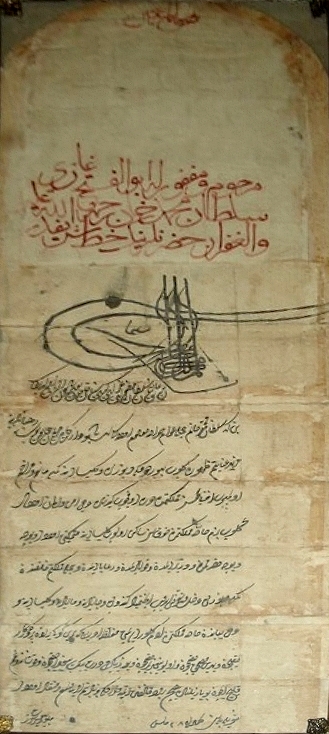Ahdname Of Milodraž on:
[Wikipedia]
[Google]
[Amazon]
 The Ahdname of Milodraž (/Милодрашка ахднама), also called the Ahdname of Fojnica (Фојничка ахднама/''Fojnička ahdnama''), was the '' ahdname'' issued on 28 May 1463 (or 1464) by the Ottoman sultan
The Ahdname of Milodraž (/Милодрашка ахднама), also called the Ahdname of Fojnica (Фојничка ахднама/''Fojnička ahdnama''), was the '' ahdname'' issued on 28 May 1463 (or 1464) by the Ottoman sultan
The amazing life of the Ottoman Bosnian Ahdname
* {{DEFAULTSORT:Ahdname of Milodraz Christianity in the Ottoman Empire Freedom of religion Catholic Church in Bosnia and Herzegovina 1460s in the Ottoman Empire 1463 in Europe Ottoman period in the history of Bosnia and Herzegovina Religion in Bosnia and Herzegovina during Ottoman period
 The Ahdname of Milodraž (/Милодрашка ахднама), also called the Ahdname of Fojnica (Фојничка ахднама/''Fojnička ahdnama''), was the '' ahdname'' issued on 28 May 1463 (or 1464) by the Ottoman sultan
The Ahdname of Milodraž (/Милодрашка ахднама), also called the Ahdname of Fojnica (Фојничка ахднама/''Fojnička ahdnama''), was the '' ahdname'' issued on 28 May 1463 (or 1464) by the Ottoman sultan Mehmed the Conqueror
Mehmed II (; , ; 30 March 14323 May 1481), commonly known as Mehmed the Conqueror (; ), was twice the sultan of the Ottoman Empire from August 1444 to September 1446 and then later from February 1451 to May 1481.
In Mehmed II's first reign, ...
to Bosnian Franciscans, represented by Anđeo Zvizdović.
Tradition and history
According to Bosnian Franciscan tradition, Mehmed was preparing to depart following theOttoman conquest of Bosnia
The Ottoman conquest of Bosnia and Herzegovina was a process that started roughly in 1386, when the first Ottoman attacks on the Kingdom of Bosnia took place. In 1451, more than 65 years after its initial attacks, the Ottoman Empire officially es ...
when Anđeo Zvizdović came to meet him in the Ottoman military camp in Milodraž
Milodraž was a settlement in the Kingdom of Bosnia, situated on an important road connecting the towns of Visoko during the Middle Ages, Visoko and Fojnica. No remains of it have been found, but royal charters and Republic of Ragusa, Ragusan doc ...
. Led in by Mehmed's soldiers, Zvizdović drew the Sultan's attention to the exodus of Catholics from the newly conquered country. The friar specifically pointed to the necessity of maintaining the merchants, craftsmen and miners, and so succeeded in receiving Mehmed's solemn promise of religious tolerance
Religious tolerance or religious toleration may signify "no more than forbearance and the permission given by the adherents of a dominant religion for other religions to exist, even though the latter are looked on with disapproval as inferior, ...
. The Franciscans of Bosna Argentina recognized Mehmed as their sovereign, and in return he promised that "the Bosnian priests shall have freedom and protection, and may return to and settle the lands in the Empire in their monasteries without consternation. No-one is to attack them, nor threaten their lives, property or churches." Its form and content, as well as Mehmed's personal oath, resemble that of an international treaty
A treaty is a formal, legally binding written agreement between sovereign states and/or international organizations that is governed by international law. A treaty may also be known as an international agreement, protocol, covenant, conventio ...
.
The rights expressed in the Ahdname of Milodraž were reiterated by all subsequent Ottoman sultans, but the Franciscans were nevertheless in a difficult position with the local authorities. Although they were loyal to the Ottoman regime, the local government often suspected them of aiding the Catholic Habsburg Empire, the Ottoman Empire's greatest enemy. Bosnian Franciscans used the Ahdname of Milodraž not only in relations with the Muslim authorities, but also to protect themselves from the ambitions of Eastern Orthodox
Eastern Orthodoxy, otherwise known as Eastern Orthodox Christianity or Byzantine Christianity, is one of the three main Branches of Christianity, branches of Chalcedonian Christianity, alongside Catholic Church, Catholicism and Protestantism ...
clergy when the latter claimed the right to collect tax from them too on the basis of an earlier ''firman
A firman (; ), at the constitutional level, was a royal mandate or decree issued by a sovereign in an Islamic state. During various periods such firmans were collected and applied as traditional bodies of law. The English word ''firman'' co ...
''. The Ahdname of Milodraž is often said to have enabled the survival of Roman Catholicism in Bosnia and Herzegovina.
Historicity
The Ahdname of Milodraž has been preserved in transcripts; an ''ahdname'' was likely also issued to the Franciscans ofSrebrenica
Srebrenica ( sr-cyrl, Сребреница, ) is a town and municipality in Republika Srpska, Bosnia and Herzegovina. It is a small mountain town, with its main industry being salt mining and a nearby spa.
During the Bosnian War in 1995, Srebr ...
in 1462, but it has been entirely lost. The absence of the original document led some historians to describe the Ahdname of Milodraž as a forgery. Its historicity was only confirmed in the mid-20th century.
References
External links
The amazing life of the Ottoman Bosnian Ahdname
* {{DEFAULTSORT:Ahdname of Milodraz Christianity in the Ottoman Empire Freedom of religion Catholic Church in Bosnia and Herzegovina 1460s in the Ottoman Empire 1463 in Europe Ottoman period in the history of Bosnia and Herzegovina Religion in Bosnia and Herzegovina during Ottoman period